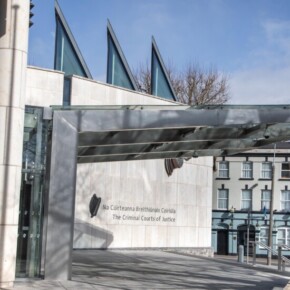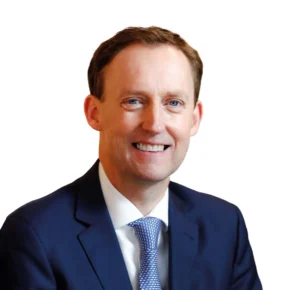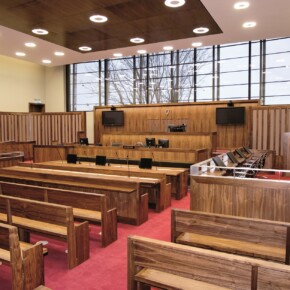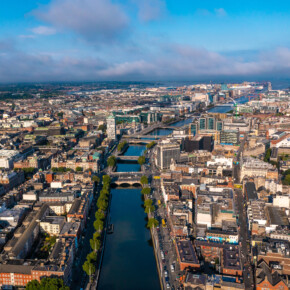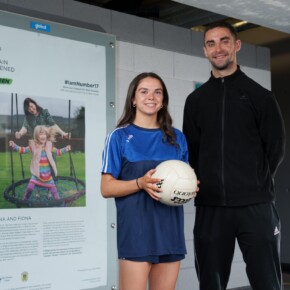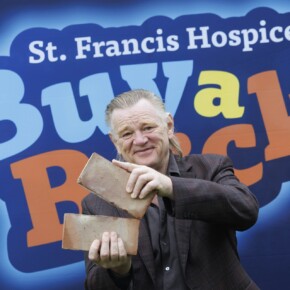Businessman allowed account to be used for €1 million worth of laundering
Dublin People 15 Mar 2024
By Jessica Magee
A judge has told an American who allowed his bank account to be used to transfer €1.23 million of the proceeds of crime, believing the money was being invested in building a vertical wheatgrass farm in Turkey, that “he should have known better”.
Darren Ducoté (48) was handed a two-year prison sentence after he pleaded guilty to possessing the money as the proceeds of crime on the basis of recklessness on dates between January and May 2021.
Ducoté was the owner of an award-winning nutrition company called The Little Pharma, which manufactured wheatgrass juice shots.
Passing sentence on Thursday at Dublin Circuit Criminal Court, Judge Martin Nolan said that a “large amount” of money was involved in this case and that criminals had gained due to Ducoté’s involvement.
He noted Ducoté’s plea was on the basis of recklessness and that he had taken a risk that the scheme and the money were “legitimate”.
The judge said it appeared that Ducoté was unlikely to re-offend in future based on the mitigation and his personal circumstances before adding that he must impose a custodial sentence due to the amount of money involved.
The judge said that the amount of money was “too large” and the “benefit to criminals too great” to allow Ducoté to “go unpunished”.
He noted Ducoté’s age and said he “should have known better” but “suspended his facility for disbelief”.
Ducoté, with an address at Brookview Court, Tallaght, Dublin 24, registered his company in 2016 and opened a Bank of Ireland account in the company’s name.
Detective Garda David Jennings from the Criminal Assets Bureau told David Perry BL, prosecuting, that the case came to light after staff at Bank of Ireland became suspicious about the company’s account.
The court heard that until January 2021, the bank account had been largely dormant, but then a significant amount of money was transferred into it over an 11-week period.
In total, €1,223,869 came into the bank account through 77 different payments, mostly made by German investors.
The amounts of money transferred ranged from between €1,000 to €213,000, with an average transfer of between €2,000 and €5,000.
As soon as the payments were received into Little Pharma’s account, they were immediately transferred out of the jurisdiction, with the vast majority of the money going to an account in Turkey in the name of Gonka Logistics Group.
Twelve transactions out of the company’s account, amounting to €30,200, went to an account called Ducoté, which the accused later accepted belonged to him.
The remaining €12,000 of the money in the Little Pharma account was dispersed through routine transactions, such as buying petrol from Applegreen or Circle K and other small transactions at Centra, Londis, or ATM withdrawals.
Bank staff contacted Ducoté, who provided a detailed explanation and said his company had built a vertical wheatgrass farm in Ballymount and wanted to upscale their operation and build a €12.5 million farm in Istanbul.
Ducoté said he had signed a deal with Mayfair International, which would fund the build and complete the necessary due diligence.
He said he was due to receive €800,000 for the first stage of the build and that he would transfer these funds to a company called Gonka Logistics Group, which had been outsourced for the building project.
Bank staff told Ducoté that they were very concerned and feared he had been duped by Mayfair and that there would be no farm.
On May 10, 2021, Ducoté contacted the Bank of Ireland and asked for a recall of the payments made to Gonka Logistics, in order to repay the people who had paid into his account.
“I’d now like to recall all payments made to Gonka Logistics. This project has now come to a halt. I don’t want people to be out of pocket. Please let me know what’s required,” Ducoté wrote to the bank, but bank staff were unable to contact him after this communication.
Gardaí were called to investigate the account and sought assistance from Interpol, but only managed to locate one injured party who was described as being a victim of investment fraud.
The German man transferred €10,000 into the Little Pharma account on March 26, 2021, but he did not submit a victim impact statement.
Gda Jennings confirmed that none of the monies laundered had been recovered to date and were never likely to be recovered.
The court heard that gardaí called to Ducoté’s house but found him en route to the airport to fly to the United States to bury his father.
Ducoté met with gardaí by appointment in March 2023 on his return from the United States and accepted that he had received various payments into his account and had transferred them back out.
He said his company, which opened in 2016, had been hit hard in lockdown, but that he got back into production and delivered his product around the country.
He said that in January 2021, he “met someone in a shop” who befriended him and convinced him that he could find funders to build a wheatgrass facility in Turkey.
Ducoté agreed that he never went to Turkey, never met any of his investors and had “no idea” who owned accounts to which he was transferring money.
He told gardaí that, on reflection, “Maybe if it was a legitimate deal, I would have met them.”
Ducoté said that his whole life changed after he was called to talk to a bank official.
“I realised I’d been conned. I had a major breakdown,” he said.
Ducoté has several previous convictions, including one for serious assault committed in 1987 when he was a minor. His other offences include 16 road traffic matters and some for failing to appear.
Gda Jennings agreed with Michael Bowman SC, defending, that Ducoté came across as genuinely remorseful and had become emotional in interview.
The court heard that Ducoté’s company, Little Pharma, had received several awards and had reached the finals of the Entrepreneur of the Year Award.
The prosecuting garda further agreed that Ducoté’s partner, who was originally a co-director of the company, removed herself from the directorship because she believed the offer made to fund the farm in Turkey was “too good to be true”.
She had no knowledge of the transactions taking place in the company’s account.
The court heard that the couple, who were together for 30 years and have three children, separated and that Ducoté “collapsed emotionally”.
A psychiatric report submitted to the court confirmed that Ducoté has a severe anxiety disorder and symptoms consistent with ADHD and autism.
Mr Bowman said his client’s obsessive-compulsive traits made him vulnerable to exploitation and blinded him to what was going on.
“His obsession with wheatgrass had taken over his life. He became obsessed with bringing this product to the market. He fervently believed in this dream but ended up losing everything,” said Mr Bowman.
Ducoté’s risk of reoffending was assessed as being at the lowest level, the court heard, and he was fully cooperative with gardaí throughout the investigation.
He did not name the person he had met in the shop as he was in fear for his family, the court heard.
Ducoté felt he was entitled to the €30,000 he received as legitimate payment, commensurate with his involvement with the company, counsel said.
When Judge Nolan suggested that “Any rational person would have come to the conclusion that this was dodgy,” Mr Bowman replied: “The ability to make a rational decision had effectively abandoned Mr Ducoté. He genuinely believed in a vision of himself and his product and that his product would bring relief to a far wider community.”
The court heard that Ducoté has recently worked as a delivery driver.


